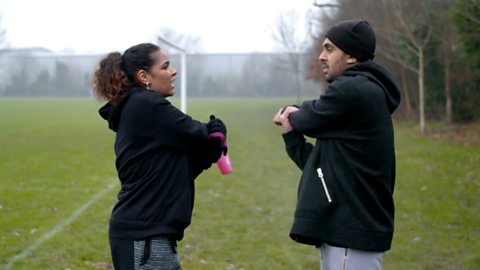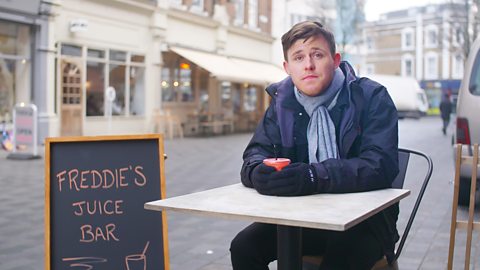Using nouns and capital letters
Watch the video to find out more.
Speaker 1: (TO AUDIENCE) When we write even a very simple sentence, it's important that it can be read clearly.
Speaker 2: (TO OTHER PEOPLE) What do you think of this?
'Friends and neighbours, please come to Lee, Rob and Beth's house party at 46 Barfield Road to celebrate our first year of living in Leicester.'
Speaker 1: Sounds perfect.
Speaker 3: IÔÇÖll type it up!
Speaker 1: (TO AUDIENCE) Beth only needs a short sentence for the invite, but every sentence needs to start with a capital letter and end with a full stop.
This sentence is also full of nouns - the names of people, places or objects - and there are two types.
Common nouns are exactly that, common.
There are more than one of them: 'friends', 'neighbours', 'house', 'party' and 'year'.
And unless they're at the start of a sentence, as with 'Friends' here, they don't need capital letters.
The other types of nouns here are proper nouns.
And these do need capital letters, wherever they are in a sentence.
Proper nouns are used to name specific or unique things, such as countries, cities or people.
Using nouns and capital letters correctly helps to make sure your writing is understood.
Speaker 2: (TO OTHER PEOPLE) Put, 'Everyone welcome.'
(LOUD MUSIC FROM FLOOR ABOVE)
Speaker 3: Is everyone welcome?
Spot the missing capital letters
Test your knowledge with this activity.
Using adjectives in writing
Watch the video to find out more.
Speaker 1: (TO AUDIENCE) Adjectives modify and describe other words, give writing clarity and make it more interesting.
Scarlett's band are having a gig next week, so we're trying to add adjectives to the advert to try and make more people come along.
(TO OTHER PEOPLE) OK, so how would you describe your band?
Speaker 2: Horrifying. Chilling!
Speaker 1: I don't think those words will make people rush to come and see your band. We need positive adjectives.
How about 'sensational, electrifying local band'?
(TO AUDIENCE) These are descriptions that make the gig sound more fun than horrifying and chilling.
Speaker 3: (TO OTHER PEOPLE) How would you describe your music?
Speaker 2: Shocking, scary, dangerous!
Speaker 3: How about, 'fiery rock band mixed with powerful electronica and exciting indie pop'?
Speaker 1: (TO AUDIENCE) Fiery, powerful and exciting.
All adjectives that say more about the music and hopefully persuade more people to come to the gig.
Speaker 2: (TO OTHER PEOPLE) Brilliant, pulsating bass lines!
Speaker 1: Fantastic!
Speaker 2: Dramatic, thrilling lyrics.
Speaker 3: Much better.
Speaker 2: Bitter, grisly, gruesome music!
Put the adjectives in order
Test your knowledge with this activity.
What are conjunctions?
Watch the video to find out more.
Speaker 1: 'Dear Mr Coleman, we tried to phone you this week.
'We have not been able to speak to you.
'We are having a problem with mice.'
ItÔÇÖs good but the sentences need to flow a bit better.
Speaker 2: Agreed.
(TO AUDIENCE) I wrote to our landlord about a problem we're having.
The sentences are simple and are as short as sentences can be. Just one idea or clause.
Compound sentences join together more than one idea or clause.
They're better at conveying complex ideas and also make writing flow.
Speaker 1: (TO OTHER PEOPLE) 'We tried to phone you this week but we have not been able to speak to you.'
Speaker 2: (TO AUDIENCE) The two ideas are connected.
We tried calling the landlord but we weren't able to speak to him.
Words that join two clauses together are called conjunctions. Words like 'and', 'but', 'although'.
Speaker 1: (TO OTHER PEOPLE) 'We would be grateful if you would phone as soon as possible, although we would prefer it if you visited the flat in person, and could see the mice problem for yourself.'
Speaker 2: (TO AUDIENCE) Three clauses with two conjunctions.
(TO OTHER PEOPLE) Either there's a mouse the size of a football boot or we have a rat problem!
Find the conjunctions
Test your knowledge with this activity.
More on Learn the basics
Find out more by working through a topic
- count7 of 10

- count8 of 10

- count10 of 10
